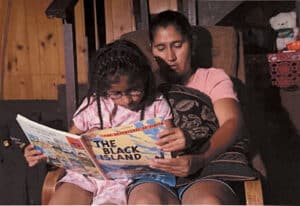The month of December is often referenced as the most wonderful time of year, and I have always taken advantage of this time to personally reflect and think about the successes and challenges over the past 12 months. 2023 has been a tumultuous year for me as I personally experienced the best and worst that our profession has to offer, getting caught in the crossfires of a book ban aimed at dismantling the foundation of the early learning profession. My experience has strengthened my resolve that we must invest in young children and the workforce that serves them by providing holistic, high quality early learning environments.
I am frequently asked how the so-called “culture wars” impact early childhood education. I begin these conversations praising our early childhood workforce for their resilience and commitment to early learning. We show up every day to serve children and families despite what’s happening around us. We hug babies and toddlers and offer support for families when our own world is crumbling due to the lack of infrastructure to fund our profession and support our work to create inclusive early childhood systems.
We cannot continue to ask more and more of our workforce while our country continues to devalue and disrespect our early educators.
- Early childhood workforce turnover is as high as 40% 1
- Average wages are $11-15/hour, with early educator poverty rates 8X that of K-12 educators. The federal poverty line for a family of 4 is $30,000. A typical early educator earning the average hourly wage would come in around $26,000 annually 2
- Professionals are deeply stressed, with depression rates 13% higher than the national average 3
These statistics are compounded when we consider that our workforce is comprised primarily of women – particularly women of color.
Recently, we have seen yet another wave of oppressive legislation and public attacks, including doing away with loan forgiveness and affirmative action, striking the right to abortion, and demonizing and limiting the use of words and practices around diversity, equity, inclusion and belonging.
All of these efforts silence, scare and limit our efforts to foster a diverse and effective workforce that provides high quality early learning experiences for children and families. How can we be okay with policies and practices that discriminate against children and families while disregarding their culture and diversity?
Attacking Early Childhood Quality
On a personal note, for 5 years I led in a state where we heralded pre-k as a bi-partisan policy effort and as a result we had a pre-k program that was number 1 in reaching NIEER (National Institute for Early Education Research) quality for 17 years in a row. For DAP (Developmentally Appropriate Practice) to be under attack now is unconscionable as DAP was always the foundation for quality in our classrooms.
Terms including “culturally responsive,” “social-emotional learning,” “implicit bias,” and “diversity” are being censured. When states change competencies, dismantle standards and professional learning to remove these words, it prevents our workforce from receiving the support they need to employ best practices that are critical for children’s development. An urgent example is the crisis we are experiencing around harsh discipline practices that disproportionately affect black children. We must teach culturally responsive, anti-racist, and anti-bias pedagogy to address this.
Silencing and Restricting Workforce Rights
We have a staffing crisis and desperately need qualified, prepared teachers and staff. Striking down Affirmative Action and Loan Forgiveness programs shuts down essential educational support for staff.
When our professionals can’t access the healthcare they need for themselves and their families because of losing Reproductive Rights, it jeopardizes well-being.
“Color Blind” lawsuits threaten specific programs and interventions for Black, LatinX, and indigenous children and families who make up both our workforce and classroom populations. We see gaps in rights, quality of life, and wealth growing even bigger from this discrimination and racism. The workforce, and the children and families we serve, are from diverse backgrounds and we cannot serve them effectively when we employ strategies that force us to ignore the complexities of race, culture and ethnicity.
A question I keep hearing is, “How can we remain hopeful and enable a brighter future for our professionals, families and children?” My response is that there is no living and no better tomorrow without hope. Hope allows us to return each day knowing that we are making a difference and putting the needs of others first.
At Start Early our mission is to eliminate the opportunity gap so that all children can thrive and learn. We are focused on four areas of action:
- Career Pathways. We must create accessible and affordable pathways to support our workforce in getting the credentials and knowledge they need to earn higher wages.
- Professional Learning. We need powerful, rich onboarding to support new staff. We must improve workplace culture and climate to be inclusive and supportive. And we need to foster ongoing learning to increase educator effectiveness and confidence – and improve retention.
- Engage Congress & Lawmakers. We must raise awareness about the science behind early childhood and demand support for early learning as the economic plan for improving our country and preparing tomorrow’s leaders.
- Support Each Other. And equally important, we can create space to slow down and be intentional about supportive environments in our programs and classrooms. We can embrace rest, joy, relationships, and connections. This is what will help us cultivate resiliency and hope as we face these historic challenges to our workforce.
“Culture Wars” are a call to action for us all. As we prepare to end one year and start a new one, we must ensure that the early learning workforce has the support necessary to build strong relationships with children and families that last a lifetime. Our educators must not be forced to work in fear of retaliation for using strategies that optimize early learning spaces. It is up to each of us to do our part to tackle these issues with those in power. We must arm ourselves with knowledge and engage our communities and local coalitions to spread the word about why the work we are doing for our youngest citizens matters. We must demand for every child what we expect for our own young children.
Sources
1Turnover: Ed Surge; OPRE; Yale Medicine
2 Hourly Wage Average & Rate of Poverty: 2020 Early Educator Workforce Index; Alabama
3Depression: Children’s Equity Project, Mental Health Report

 In July 2023, Pamela Williams joined a global panel discussion at the
In July 2023, Pamela Williams joined a global panel discussion at the 



 Whether it is preparing an older sibling for the arrival of a new baby or potty training a toddler, Camille Carlson recognizes that everyone – whether they are aware of it or not – uses
Whether it is preparing an older sibling for the arrival of a new baby or potty training a toddler, Camille Carlson recognizes that everyone – whether they are aware of it or not – uses  Camille uses her expertise to help home visiting programs deliver services relevant to the unique needs of the children and families they support. Her firsthand experience as a parent fuels her desire to improve systems of support for children, their families, and the teams of staff that serve them. Camille’s motivation for this work grew when she was pregnant with her second child. “During my pregnancy, I had the support of home visitors and supervisors at my fingertips. As I listened to home visiting professionals across the state discuss parent coaching and family observations, I started applying their valuable insight to navigate the changing dynamics of my life with two children. This process helped me gain confidence in my parenting skills, and it was a beautiful reminder that family is central to our work. I was overwhelmed by the support that was given to me and the confidence that it brought, which emphasized the importance of sharing such a positive experience with others.”
Camille uses her expertise to help home visiting programs deliver services relevant to the unique needs of the children and families they support. Her firsthand experience as a parent fuels her desire to improve systems of support for children, their families, and the teams of staff that serve them. Camille’s motivation for this work grew when she was pregnant with her second child. “During my pregnancy, I had the support of home visitors and supervisors at my fingertips. As I listened to home visiting professionals across the state discuss parent coaching and family observations, I started applying their valuable insight to navigate the changing dynamics of my life with two children. This process helped me gain confidence in my parenting skills, and it was a beautiful reminder that family is central to our work. I was overwhelmed by the support that was given to me and the confidence that it brought, which emphasized the importance of sharing such a positive experience with others.” Quality improvement is essential to providing successful home visiting services where staff collaboratively establish goals, reflect and create actionable steps for improvement. By adhering to a CQI process, home visiting programs can build strong relationships with families, make well-planned decisions and increase positive outcomes to achieve better support for children and families.
Quality improvement is essential to providing successful home visiting services where staff collaboratively establish goals, reflect and create actionable steps for improvement. By adhering to a CQI process, home visiting programs can build strong relationships with families, make well-planned decisions and increase positive outcomes to achieve better support for children and families. As the program analyst for
As the program analyst for 